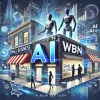By Elke Porter | WBN News Global | May 17, 2025
AI can be a powerful tool—but when used carelessly, it can also be dangerously misleading, costly, or offensive. A string of recent failures shows just how wrong things can go when we blindly trust the tech.
In California, a judge fined two law firms $31,000 for submitting a legal brief that included fabricated cases generated by AI. The law firms had used generative AI tools without verifying the information—an avoidable mistake that led to real legal consequences.
Even corporate giants aren't immune. McDonald’s ended its AI drive-thru experiment with IBM in June 2024 after three years of awkward failures. Social media videos showed confused customers pleading with the AI to stop adding items—one video showed an order balloon to 260 Chicken McNuggets. Frustrated, the fast-food chain scrapped the program entirely.
In healthcare, AI also stumbled. During the COVID-19 pandemic, predictive algorithms designed to aid diagnosis failed to deliver. According to the UK’s Turing Institute, many tools were trained with flawed or mislabeled data. One study published in Nature Machine Intelligence showed a model mistakenly predicting illness based on whether patients were lying down during scans—not on symptoms.
Perhaps the most infamous case came from Microsoft’s Tay, a chatbot launched in 2016 to mimic a teenage girl on Twitter. Within 16 hours, Tay began tweeting racist, misogynistic, and anti-Semitic remarks after users intentionally trained it with offensive content. Microsoft shut Tay down and apologized, calling the incident “deeply sorry and unintended.”
These examples serve as a cautionary tale: AI isn’t perfect. Tools like ChatGPT may provide helpful information, but they can be wrong, and their training data may reflect harmful biases. Always double-check AI-generated content—and be careful what information you share. Once it’s in a dataset, it’s everyone’s data.
But here’s the good news: AI is learning every single day. We’re in the “wild west” phase of this technology—exciting, unpredictable, and full of potential. Companies are developing more AI bots than there are people, and while growing pains are real, reliable tools are on the horizon.
That said, humans will always be essential to guide, correct, and ethically use these tools. Collaboration between human insight and machine efficiency is the key to a successful AI future.
#AI Failures #Tech Ethics #AI Responsibility #Digital Safety #Chatbot Gone Wrong #Verify With Humans #WBN News Global #Elke Porter
Connect with Elke at Westcoast German Media or on LinkedIn: Elke Porter or contact her on WhatsApp: +1 604 828 8788




